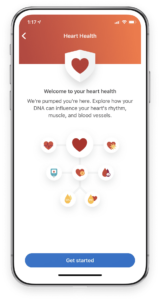Pre-pandemic, heart disease kills more Americans than any other condition each year. So understanding your risks for heart disease and learning how to mitigate them is a good first step toward prevention.
Heart disease itself is really several different conditions but the most common is coronary artery disease which develops due to a build-up of plaque that narrows your arteries and restricts blood flow. Over time, this can affect your heart’s rhythm, damage your heart muscles, obstruct blood flow, and put you at a higher risk of heart attack or stroke.
A Healthy Heart
The best recipe for a healthy heart is eating right, exercising, and maintaining a healthy weight. But understanding other underlying risks for heart disease is also important. Your family’s health history, age, and ethnicity can all play a role in your risk for heart disease. Taking healthy actions to lower blood pressure, cholesterol, and blood sugar can help reduce your risk.
23andMe’s Health + Ancestry Service offers several reports that look at heart-related conditions, including reports on familial hypercholesterolemia (FH), TTR-related hereditary amyloidosis, and type 2 diabetes (powered by 23andMe research).*
Going Deeper
But for customers who want to go deeper, we also offer 23andMe+ Premium, an annual membership with 10+ exclusive reports and features delivered to you throughout the year‡. Among those reports and features, there are reports powered by 23andMe research on a number of heart-related conditions, including atrial fibrillation, coronary artery disease, high blood pressure, and LDL cholesterol.
Just added to that list is a 23andMe+ Premium report on Triglycerides — a type of fat, or lipid, that the body uses to store energy from food for future use. High triglyceride levels are associated with an increased likelihood of developing heart disease, stroke, and sometimes pancreatitis.
Triglycerides Report
The 23andMe+ Premium Triglycerides report is powered by a statistical model using data from millions of 23andMe customers who consented to participate in research. Unlike Genetic Health Risk reports* that use a few variants known to have a large impact on risk-based on external studies, the report, powered by 23andMe research, creates a polygenic score that includes more than 4,000 genetic markers to estimate the likelihood of developing high triglyceride levels. Having high triglyceride levels is defined as 150 milligrams per deciliter (mg/dl) or more. The model also takes into account a customer’s ethnicity and sex. The report does not diagnose high triglycerides. If you are concerned about your likelihood of developing high triglycerides, or have questions about your report, consult with a healthcare professional.
Many people in the U.S. develop high triglycerides levels, but because there are typically no symptoms many remain unaware that their levels are elevated. Most people only learn that they have an issue because they’ve had a lipid panel done, so learning about an increased genetic likelihood could start a conversation with a doctor and spur action to lower their chances. Healthy lifestyle habits can help lower triglycerides and reduce the risk of heart disease or stroke. Those actions include maintaining a healthy weight, avoiding sugary foods, and replacing saturated fats in your diet with healthier unsaturated fats. Those are fats from vegetable oils, nuts, and fish, for example. It’s also recommended to limit alcohol consumption. Also, regular exercise — 30 minutes of moderate to vigorous exercise on most days of the week — can go a long way toward maintaining heart health.
Find out more about 23andMe’s Health + Ancestry Service or 23andMe+ Premium membership go here.
*23andMe health predisposition reports include both reports that meet FDA requirements for genetic health risks and reports which are based on 23andMe research and have not been reviewed by the FDA. The test uses qualitative genotyping to detect select clinically relevant variants in the genomic DNA of adults from saliva for the purpose of reporting and interpreting genetic health risks. It is not intended to diagnose any disease. Your ethnicity may affect the relevance of each report and how your genetic health risk results are interpreted. Each genetic health risk report describes if a person has variants associated with a higher risk of developing a disease, but does not describe a person’s overall risk of developing the disease. The test is not intended to tell you anything about your current state of health, or to be used to make medical decisions, including whether or not you should take a medication, how much of a medication you should take, or determine any treatment. For important information and limitations regarding each genetic health risk report, visit 23andme.com/test-info/.
‡ 10+ reports and features will be added annually from January to December.